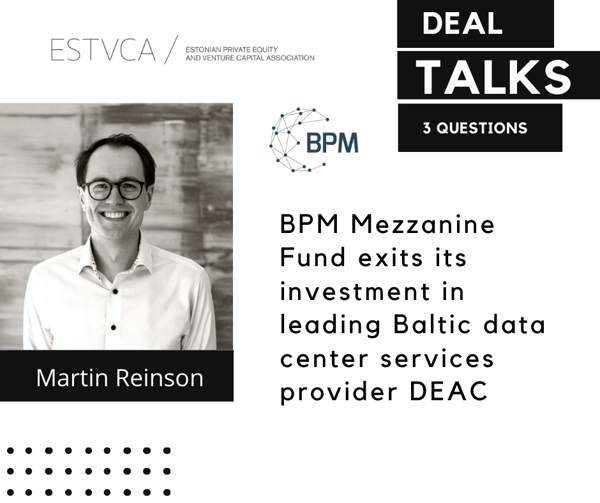DEAL TALKS: Martin Reinson of BPM Capital talks about their exit from leading Baltic data center services provider DEAC
BPM Mezzanine Fund SICAV-SIF, SCA (BPM) invested in the leading Baltic data center operator Digitalas Ekonomikas Attistibas Centrs (DEAC) to support its growth back in October 2016. The investment was used to improve technical equipment and infrastructure, as well as refinancing a part of existing liabilities. On 21st August 2020 DEAC announced the sale of 100% of shares the Company to Quaero European Infrastructure Fund II. With this transaction also BPM exited from its investment into DEAC.
EstVCA DEAL TALKS asked a few questions about the exit and its details. Here’s what Martin said:
1. What makes DEAC unique?
I think data center is perceived by outsiders as a relatively simple and straightforward business, driven by infrastructure, competitive pricing of electricity, and data transfer. However, this is not an accurate reflection of reality. In order to succeed you have to offer superb service to your clients and offer more than a top-notch building with high-tech fire extinguishers. It is especially demanding to convince clients outside Latvia to store data here in your data center and if you have managed to attract hundreds, then this serves as the best proof of a reputation of quality and reliability (failures are extremely costly in this business). So, eventually, it means that your competence matters = your team matters the most. Only with dedicated service and personal approach can a small data center successfully compete against the global giants in this business.
2. How did BPM Capital help to develop the business before exit?
BPM with our mezzanine instrument is purely a financial investor, who does not assume an active role in managing the company. We invest in teams, which we rely on and we would like to give them the freedom to run their businesses, as they are the experts in a given sector. Management teams highly appreciate the freedom and flexibility (at least it is the impression that we have). We can and we have assisted companies in financial and strategic matters – which exit routes to take, whom to approach, whether to improve accounting or finance functions in the company, etc. I would say companies undervalue CFO functions quite often. They tend to view it from an accounting perspective – you need your accounting done and that’s it. Following our entry to DEAC, a full-time CFO was brought on board and we saw how it improved not only finance function, but the positive impact was felt on a lot wider scale (preparation of sales offers, procurement).
3. The biggest challenge on the road
The biggest challenge was and is senior financing environment in the region. Ironically, this is the key reason why we managed to enter in the first place, but it constitutes a wider problem. On the one hand, banks becoming more conservative is not bad news for mezzanine lender. If one would develop some sort of a “Sharpe ratio” metric for private equity, then in the current environment mezzanine lenders were definitely able to demonstrate excellent numbers, as we are able to take some of the senior risk to ourselves. But the key problem lies in the unpredictability of senior lenders, you never know what they may come up with tomorrow in this environment and this means it is more difficult for entrepreneurs to make decisions which have a long-term impact, not to mention pure and simple man-hours that your accounting or finance department has to devote on a daily basis.
Key advisors of the deal
We received valuable legal advice from Vilgerts law office at entry and exit. Merhels assisted us with financial and tax due diligence at entry.
- Read more on the investment HERE
Further info:
Martin Reinson
BPM Capital
Partner
martin.reinson@bpmcapital.eu
